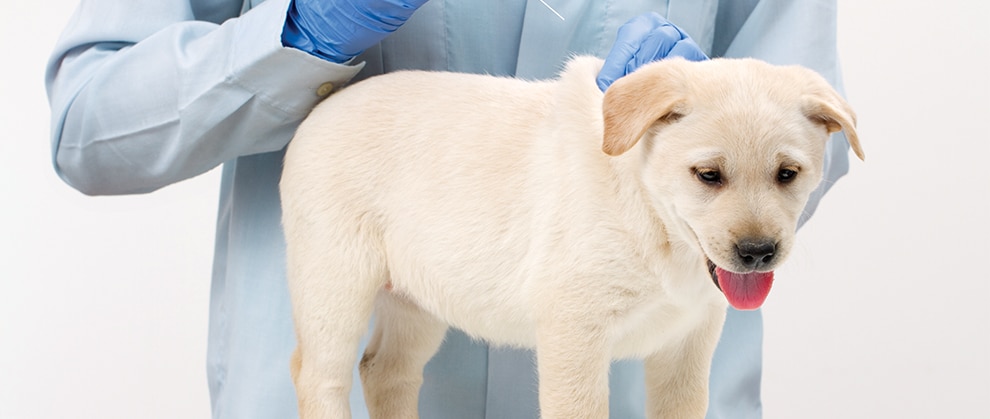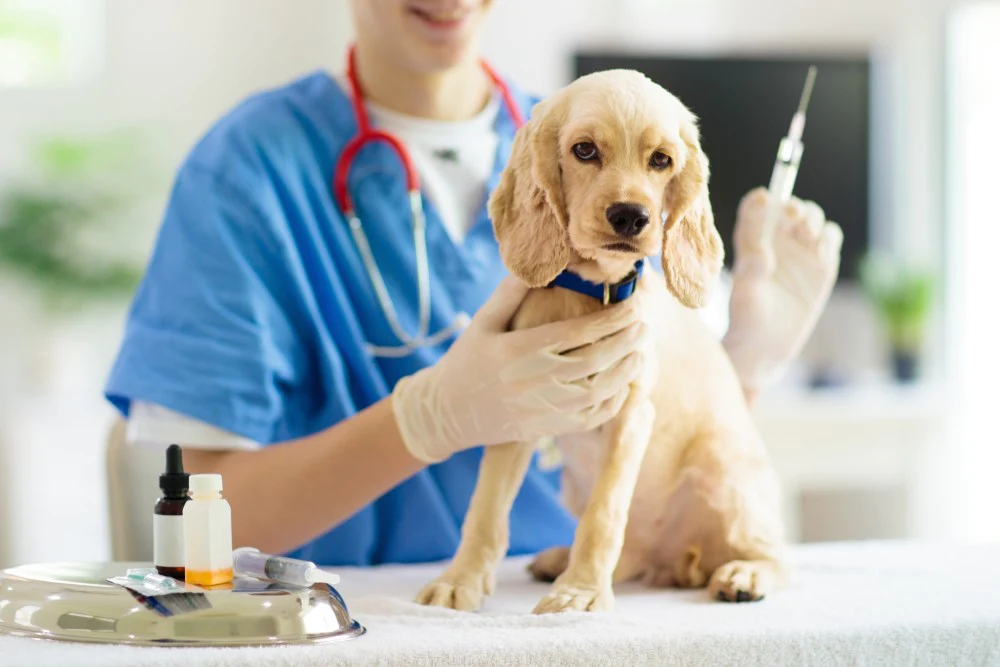
Vaccines are necessary for canine protection against a wide range of diseases, just as they are for human beings. Laws might even stipulate that your pet be vaccinated. To ensure your dog’s continued good health, your veterinarian may also recommend a series of vaccinations. The Bordetella vaccination is one option that your veterinarian may suggest. If your dog is going to be boarded at the vet, doggie daycare, or dog park, you should get them the Bordetella vaccination.
There are certain details to consider when vaccinating your dog against Bordetella. The benefits and hazards of the Bordetella vaccination for dogs, as well as the sorts of dogs that should get it, are discussed in detail here.
The Mystery of Bordetella
An inflamed upper respiratory tract in a dog is caused by the bacterium known as Bordetella.
Bordetella may weaken your dog’s immune system and cause secondary infections, in addition to coughing and inflammation.
Ultimately, the bacteria Bordetella is to blame for canine coughing, sometimes known as kennel cough. Kennel cough is a term often used by veterinarians to avoid confusing pet owners about Bordetella infections.
How does one define and describe kennel cough?
Dogs with respiratory problems are said to have kennel cough. Dogs in close quarters, such as kennels, are at increased risk of contracting the disease due to the high likelihood of dog-to-dog contact. Although kennel cough alone is not lethal, it may develop into more serious respiratory conditions such as bronchopneumonia and chronic bronchitis.
Aerosol droplets, canine-to-canine contact, and shared surfaces like food bowls and crates are all vectors for the transmission of kennel cough.
Kennel cough is most common at dog boarding facilities, kennels, veterinarian offices, and dog parks where numerous dogs congregate. Still, any item that a diseased dog has handled may spread kennel cough to other dogs. Even those who don’t come into direct contact with diseased dogs while on the job at veterinary clinics or animal shelters might get the kennel cough and spread it to their families.
Symptoms of kennel cough in dogs include:
- Coughing: Indicators of kennel cough include a honking cough and wheezing from your dog. The most noticeable sign of kennel cough in a dog is a honking cough.
- Runny Nose: A dog’s runny nose might be due to allergies or an underlying ailment. Even though dogs have naturally damp noses, they should never be running. In the event that your dog’s nose continues to drip for more than a few days, it’s best to take him to the doctor.
- Sneezing: Dogs typically sneeze due to allergies or foreign objects, such as a blade of grass getting stuck in their noses. However, kennel cough is very similar to the common cold in humans and can result in sneezing because it’s an upper respiratory infection.
- Lack of appetite: You should be concerned if your puppy stops eating because of illness. Whenever they aren’t feeling well, many canines would rather sleep than eat.
- Lethargy: Being sick makes dogs feel tired, just like humans. Your dog needs rest for its body to heal, so if you notice your dog is lethargic, it can indicate an illness such as kennel cough.
- Fever: A fever is your dog’s body’s method of fighting against harmful germs and poisons. If your dog gets a high temperature, it’s not healthy and you should take it to the doctor immediately.
The symptoms of kennel cough are similar to those of more severe diseases including distemper and the canine influenza virus. If you see any of these signs in your dog, it is critical to get them checked out by a vet. The symptoms of kennel cough may vary greatly from dog to dog, with some showing just a few and others showing all of them. A dog could have a dry cough but no temperature.
Most dogs recover from kennel cough in a matter of days to weeks with treatment, provided they haven’t acquired any other infections or diseases. Experts advise giving the dog plenty of rest and treating any secondary illnesses with medicines and cough suppressants.
Talk to your doctor about how to keep your diseased dog isolated until they are done with treatment and how to avoid the transmission of illness to other dogs in the family.
Should I Vaccinate My Dog Against Bordetella?
For the prevention of kennel cough, the Bordetella vaccination (commonly known as the kennel cough vaccine) is advised for both pups and adult dogs. Many dogs, particularly those that live exclusively in the house and never interact with other canines, may not need the Bordetella vaccination.
While it’s always a good idea to vaccinate your dog, the Bordetella vaccination is particularly important for dogs who often interact with other canines at dog parks, daycares, grooming salons, training programs, and other pet-centric activities.
Bordetella vaccines are required at many dog-friendly businesses to protect the health of other animals. It is recommended to vaccinate your dog since some dogs might get deadly secondary illnesses.
There are, however, cases in which the Bordetella vaccination should not be given to a dog. If your dog is pregnant, immunocompromised, or ill, your vet may advise against giving it the kennel cough vaccination. When deciding whether or not to vaccinate your dog against bordetella, it is usually advisable to get advice from your veterinarian.
Schedule for the Bordetella Vaccine
The Bordetella vaccine is not mandated by law in the same way that others, like the rabies vaccine, are. Despite this, it continues to be a widely used vaccination. Although vaccination may not be necessary for all dogs, those who will be boarding or spending time with other canine companions should be vaccinated. First vaccinations for pups may be given between the ages of six and eight weeks old, depending on the vaccine mode of delivery. A second dose of the booster shot should be given to the dog four weeks after the first. If a dog hasn’t been vaccinated before the age of 16 weeks, it simply needs one booster shot.
A Bordetella vaccination for adult dogs should be given once or twice annually, depending on the dog’s risk factors. If you want to board your dog or enroll them in lessons, you may be needed to acquire a booster every six months.
A yearly booster may be sufficient if your dog seldom interacts with other canines and so poses little threat of contracting an infectious disease. You should be aware that your dog may get kennel cough from other dogs when out for a stroll in the neighborhood or anyplace else an infected dog has been.
Vaccines Against Bordetella
Bordetella vaccinations for dogs come in three primary varieties:
- To prevent your dog from the potentially fatal Bordetella virus, consider giving him the vaccination orally. Unfortunately, its efficacy is lower than that of alternative immunizations. For dogs who suffer from nervousness at the vet and can’t get their shots in any other way, this is still a viable alternative.
- The intranasal Bordetella vaccination is widely utilized in veterinary hospitals and clinics. Dogs that will be boarded shortly after immunization may benefit from its rapid onset.
- Alternatively, dogs who are easily frightened by the nasal spray form of the Bordetella vaccine may benefit from the injectable form of the vaccine.
Risks and Side Effects of the Bordetella Vaccine
All vaccinations come with their share of risks. The Bordetella vaccine, in particular, has mild symptoms, such as:
- Discomfort
- Swelling
- Low fever
- Decreased appetite
- Lethargy
- Sneezing
- Runny nose
- Coughing
Most symptoms go away within a few days after vaccination. However, if your dog’s symptoms don’t go away, call a vet to discuss whether the side effects are normal or if they should come back to the vet for an examination.
More serious symptoms of the Bordetella vaccine include:
- Vomiting
- Diarrhea
- Hives and itchy skin
- Difficulty breathing
- Collapsing
You may experience some minor discomfort, but it shouldn’t last more than a day or two at most. Consult your vet right away if your dog exhibits any of the following symptoms: extreme puffiness, fever, loss of appetite, or evidence of a respiratory infection.
Your veterinarian should, of course, be able to see your pet’s health records. If your dog has ever had an adverse response to vaccination, however, you should inform your veterinarian. Staying in the vet’s office if you’re worried your pet could have an unpleasant response is your best bet.

Tips for Taking Care of Your Dog Before the Vet Visits to Administer Vaccines
Vaccinations aren’t something any dog looks forward to, but they’re often essential for maintaining their health. Discuss with your veterinarian what supplies you should bring to your dog’s vaccination visit. When taking your dog to a new veterinarian for vaccinations, be sure to bring along any relevant medical records detailing any adverse reactions your dog may have had in the past.
Keep in mind that many canine patients experience stress while seeing the veterinarian. Vaccinating your dog will likely need you to hold them carefully throughout the procedure. When the vet visit is over, shower your pet with attention and treats.
Keep an eye out for any drastic changes in their condition over the following several days. Some minor symptoms are to be expected, but their duration shouldn’t exceed two days. If your pet has an adverse response after receiving the Bordetella vaccination, you should get them to an emergency vet immediately.
Last Words
There is currently no legal need for the bordetella vaccination, however, it is highly recommended for dog daycares, groomers, and boarding establishments. Some dogs are exempt from getting the vaccination, while others need it to avoid kennel cough and potentially fatal complications. Your veterinarian may still advise you to get the Bordetella vaccination for your dog even if he or she never interacts with other canines.
Getting vaccinated is a common source of stress for many dogs because of the traumatic experiences they’ve had at the hands of veterinarians in the past. Anxiety medications may help soothe dogs who are showing signs of distress. For help tailoring a treatment plan to your dog’s specific anxiety issues, see a veterinarian with connections to the Netherlands.